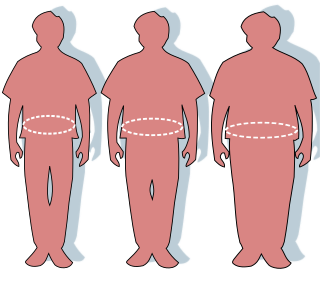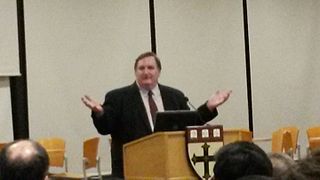
Obesity is a medical condition, sometimes considered a disease, in which excess body fat has accumulated to such an extent that it can potentially have negative effects on health. People are classified as obese when their body mass index (BMI)—a person's weight divided by the square of the person's height—is over 30 kg/m2; the range 25–30 kg/m2 is defined as overweight. Some East Asian countries use lower values to calculate obesity. Obesity is a major cause of disability and is correlated with various diseases and conditions, particularly cardiovascular diseases, type 2 diabetes, obstructive sleep apnea, certain types of cancer, and osteoarthritis.
The Center for Science in the Public Interest (CSPI) is a Washington, D.C.–based non-profit watchdog and consumer advocacy group that advocates for safer and healthier foods.
The Academy of Nutrition and Dietetics is a multi-unit enterprise that includes a 501(c)(6) trade association in the United States. With over 112,000 members, the association claims to be the largest organization of food and nutrition professionals. It has registered dietitian nutritionists (RDNs), nutrition and dietetics technicians registered (NDTRs), and other dietetics professionals as members. Founded in 1917 as the American Dietetic Association, the organization officially changed its name to the Academy of Nutrition and Dietetics in 2012. According to the group's website, about 65% of its members are RDNs, and another 2% are NDTRs. The group's primary activities include providing testimony at hearings, lobbying the United States Congress and other governmental bodies, commenting on proposed regulations, and publishing statements on various topics pertaining to food and nutrition.

Food policy is the area of public policy concerning how food is produced, processed, distributed, purchased, or provided. Food policies are designed to influence the operation of the food and agriculture system balanced with ensuring human health needs. This often includes decision-making around production and processing techniques, marketing, availability, utilization, and consumption of food, in the interest of meeting or furthering social objectives. Food policy can be promulgated on any level, from local to global, and by a government agency, business, or organization. Food policymakers engage in activities such as regulation of food-related industries, establishing eligibility standards for food assistance programs for the poor, ensuring safety of the food supply, food labeling, and even the qualifications of a product to be considered organic.
Food politics is a term which encompasses not only food policy and legislation, but all aspects of the production, control, regulation, inspection, distribution and consumption of commercially grown, and even sometimes home grown, food. The commercial aspects of food production are affected by ethical, cultural, and health concerns, as well as environmental concerns about farming and agricultural practices and retailing methods. The term also encompasses biofuels, GMO crops and pesticide use, the international food market, food aid, food security and food sovereignty, obesity, labor practices and immigrant workers, issues of water usage, animal cruelty, and climate change.

Kelly David Brownell is a clinical psychologist and scholar of public health and public policy at Duke University whose work focuses on obesity and food policy. He is a former dean of Duke's Sanford School of Public Policy. Noted for his research dealing primarily with obesity prevention, as well as the intersection of behavior, environment, and health with public policy, Brownell advised former First Lady Michelle Obama's initiatives to address childhood obesity and has testified before Congress. He is credited with coining the term "yo-yo dieting", and was named as one of "The World's 100 Most Influential People" by Time Magazine in 2006.
The Rudd Center for Food Policy and Health, formerly named the Rudd Center for Food Policy and Obesity, is a non-profit research and public policy organization that promotes solutions to food insecurity, poor diet quality, and weight bias. Located in Hartford, Connecticut at The University of Connecticut, the Rudd Center was co-founded in March 2005 at Yale University by benefactor Leslie Rudd and Kelly D. Brownell. The Rudd Center moved from Yale to the University of Connecticut in December 2014.
A fat tax is a tax or surcharge that is placed upon fattening food, beverages or on overweight individuals. It is considered an example of Pigovian taxation. A fat tax aims to discourage unhealthy diets and offset the economic costs of obesity.
A food environment is the "physical presence of food that affects a person's diet, a person's proximity to food store locations, the distribution of food stores, food service, and any physical entity by which food may be obtained, or a connected system that allows access to food".

Food marketing is the marketing of food products. It brings together the food producer and the consumer through a chain of marketing activities.
David George Gratzer is a physician, columnist, author, Congressional expert witness; he was a senior fellow at both the Manhattan Institute and the Montreal Economic Institute. Though he has written essays on topics as diverse as obesity and political campaigns, he is best known for his first book, published by ECW Press, when he was just 24: Code Blue: Reviving Canada's Health Care System. That book won the Donner Prize established by the Donner Canadian Foundation and was a national bestseller in his native Canada. Gratzer is a critic of the Canadian health care system, and of U.S. President Barack Obama's health care reform proposals. Gratzer was health care policy advisor to Rudy Giuliani's 2008 presidential campaign.

Gary Taubes is an American journalist, writer, and low-carbohydrate / high-fat (LCHF) diet advocate. His central claim is that carbohydrates, especially sugar and high-fructose corn syrup, overstimulate the secretion of insulin, causing the body to store fat in fat cells and the liver, and that it is primarily a high level of dietary carbohydrate consumption that accounts for obesity and other metabolic syndrome conditions. He is the author of Nobel Dreams (1987); Bad Science: The Short Life and Weird Times of Cold Fusion (1993); Good Calories, Bad Calories (2007), titled The Diet Delusion (2008) in the UK and Australia; Why We Get Fat: And What to Do About It (2010); The Case Against Sugar (2016); and The Case for Keto: Rethinking Weight Control and the Science and Practice of Low-Carb/High-Fat Eating (2020). Taubes's work often goes against accepted scientific, governmental, and popular tenets such as that obesity is caused by eating too much and exercising too little and that excessive consumption of fat, especially saturated fat in animal products, leads to cardiovascular disease.

The sociology of food is the study of food as it relates to the history, progression, and future development of society, encompassing its production, preparation, consumption, and distribution, its medical, ritual, spiritual, ethical and cultural applications, and related environmental and labor issues.
Based in Washington, D.C., Leadership for Healthy Communities is a $10-million national program of the Robert Wood Johnson Foundation designed to engage and support local and state government leaders nationwide in their efforts to advance public policies that support healthier communities and prevent childhood obesity. The program places an emphasis on policies with the greatest potential for increasing sustainable opportunities for physical activity and healthy eating among children at highest risk for obesity, including African-American, Latino, American Indian and Alaska Native, Asian-American and Pacific Islander children living in lower-income communities. The foundation's primary goal is the reversal of the childhood obesity epidemic by 2015.
The healthcare reform debate in the United States has been a political issue focusing upon increasing medical coverage, decreasing costs, insurance reform, and the philosophy of its provision, funding, and government involvement.

Let's Move! was a public health campaign in the United States led by former First Lady Michelle Obama. The campaign aimed to reduce childhood obesity and encourage a healthy lifestyle in children.
The National Policy and Legal Analysis Network to Prevent Childhood Obesity, or NPLAN for short, is a nonprofit organization funded by the Robert Wood Johnson Foundation, and which, according to its website, plays an important role in the Foundation's effort to reverse the obesity epidemic by 2015, a commitment that was announced in 2007. Their partners include, in addition to the RWJF, Active Living by Design and the Rudd Center for Food Policy and Obesity at Yale. They are run by ChangeLab Solutions, originally known as Public Health Law and Policy, which focuses not only on obesity but also on tobacco regulation. The NPLAN advocates for a soda tax, specifically an excise tax, and have published model legislation which earmarks the funds raised to go to programs to prevent and treat obesity. According to the American Public Health Association, they provide "legal technical assistance focused on childhood obesity prevention policy." The Network has also "developed model menu labeling ordinances, requiring chain restaurants to post calorie and other nutrition information on menus." NPLAN has advocated for the use of licensing and zoning laws to "shape the way land is used and how businesses operate," and has praised regulations requiring nutrition standards on foods sold in snack machines in schools. According to their website, they "work on four broad issue areas: healthy community food systems, healthy schools, healthy land use planning, and food marketing." The American Bar Association's director of public health and policy Marice Ashe wrote the following soon after the NPLAN's founding was announced: "NPLAN will serve as an incubator where lawyers, policymakers, advocates, and scientists collaborate to produce legal and policy tools and resources. As research and products are developed, NPLAN will also operate as a national one-stop source for access to practical, efficient, and effective legal technical assistance products."
Citizens for Health is a U.S. non-profit organization which advocates on issues affecting nutrition, obesity, dietary supplements, food labeling and other health matters.

Obesity and the environment aims to look at the different environmental factors that researchers worldwide have determined cause and perpetuate obesity. Obesity is a condition in which a person's weight is higher than what is considered healthy for their height, and is the leading cause of preventable death worldwide. Obesity can result from several factors such as poor nutritional choices, overeating, genetics, culture, and metabolism. Many diseases and health complications are associated with obesity. Worldwide, the rates of obesity have nearly tripled since 1975, leading health professionals to label the condition as a modern epidemic in most parts of the world. Current worldwide population estimates of obese adults are near 13%; overweight adults total approximately 39%.

Chile's food labelling and advertising law, formally titled Ley 20.606, sobre la composición de los alimentos y su publicidad establishes a regulatory framework on food security and healthy food with the intention of guiding consumers towards behaviour patterns that promote public health. After the 2012 law was enacted, its accompanying regulations came into full force on June 27, 2016. Andrew Jacobs, writing for The New York Times, has characterized this measure as "the world’s most ambitious attempt to remake a country’s food culture" and suggests it "could be a model for how to turn the tide on a global obesity epidemic that researchers say contributes to four million premature deaths a year."









